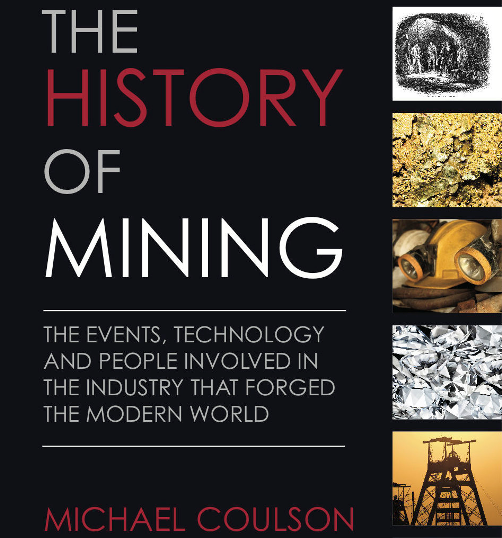To order a copy of The History of Mining please click here:http://www.harriman-house.com/products/books/23161/business/Michael-Coulson/The-History-of-Mining/
CECIL RHODES (1853-1902)
Once one of the British Empire’s most revered but also widely hated figures, Cecil John Rhodes enjoyed a burst of popularity after his death when his legacy, the Rhodes Scholar awards to Oriel College, Oxford, in particular marked him as a great philanthropist and visionary. Since then his reputation seems to have been in almost permanent decline as first his admiration for the Anglo Saxon ‘race’ and then his vision of a worldwide British Empire poisoned his public esteem and earned the contempt, particularly, of modern historians.
Rhodes was born in Bishops Stortford 30 miles north of London, the son of a clergyman. Whilst his brothers attended England’s great public schools and went up to Oxford, Rhodes was sickly and was educated locally. His health meant that he did not initially go to university but left school at 16. After being diagnosed with TB he went to South Africa to join his brother Herbert on his cotton farm in Natal. After a couple of years building up the farm Herbert, who had earlier spent a short time in the diamond fields near Kimberley in Griqualand West, returned to Kimberley and Rhodes followed. Herbert earlier had some success with his claims, but under Cecil’s direction things took on a more organised and businesslike tone.
Although neither a geologist nor an engineer, Rhodes worked his brother’s claims successfully as a digger before broadening his commercial interests to include a wide range of services to the Kimberley mining community. He also showed at least two characteristics of the traditional miner, being a man who enjoyed a drink and who used strong language, however he did not share that other vice of miners far from home; women.
Rhodes tended to have few real friends but those he did have were long lasting. As he expanded his Kimberley diamond interests he worked hand in hand with Charles Rudd and this enabled him to pursue his ambition of going up to Oxford, which he did in 1873. He divided his time between Oxford and Kimberley, not easy in those days, decades before overnight flights shrunk the journey time to a few hours. In Kimberley, Rhodes continued to build up his claims at the Big Hole where most of Kimberley’s diamonds were to be found.
There were two things obvious to Rhodes: Kimberley’s diamonds were high quality and the huge numbers of claims covering the Big Hole made mining inefficient and dangerous. Rhodes thus had two concomitant ambitions: to control the marketing of diamonds to obtain better prices from European jewellers and to create an integrated diamond mining operation at the Big Hole. Rhodes, however, was also drawn to the gold fields of the Witwatersrand in the late 1870s, when he floated Gold Fields of South Africa in London, and also to the mineral potential of what became Southern Rhodesia which was covered by the activities of The Chartered Company. His heart, though, was in the diamond fields around Kimberley and in 1889 with the purchase of the ‘French Company’ and Kimberley Central, Rhodes’s De Beers company finally had control of Kimberley’s diamond fields.
To all of this Rhodes added political ambition. He became an MP in the Cape Parliament in 1880 and ten years later he became Prime Minister of the Cape Colony. He represented a farming area with a considerable Boer vote whose interests he supported. However, he had begun to dream of a much expanded British Empire (from the Cape to Cairo) which hardly pleased the government in London at the time, and as far as it affected Africa did not please the Boers either. As a politician Rhodes began to tighten restrictions on the black and mixed race population in terms of voting, property rights and work. At the same time he introduced extensive and positive reforms in the agricultural sector and started a programme to renovate historic Cape Dutch houses that had fallen into disrepair.
As the Witwatersrand gold fields expanded, confrontation with the Boer government in Pretoria became inevitable. Rhodes was not always decisive – as conflict loomed in 1895 he backed Dr Jameson’s infamous raid to lead an uitlander revolt in Johannesburg against perceived Boer oppression, but at the last moment his support wavered. The raid descended into farce with capture and humiliating trials for Jameson and his followers. Rhodes’s political career then went into reverse. He was forced to resign as Cape Prime Minister but survived more serious personal damage due to his close relationship with Joe Chamberlain, the British Colonial Secretary.
He became leader of the Progressive Party, a capitalist-imperialist- liberal grouping, almost winning the 1897 Cape Colony election and still representing the Boer farmers of Barkly West. The following year the Anglo-Boer War began. Rhodes did not see the end of the war, his last days dogged by debilitating illness and the consequences of unwelcome attentions from Princess Catherine Radziwill, an Austrian aristocrat. He was buried in the Matopos Hills in Matabeleland in Southern Rhodesia, a country which he loved and that he had hoped would eclipse South Africa as a source of mineral riches.
Modern historians have little good to say about Rhodes. His vision of a worldwide British Empire does not play well in the hindsight of a century passed, but there is little doubt that he remains a huge figure both as a politician and as a mining magnate whose name is synonymous with the rise of South Africa’s diamond and gold industries. His grave, and those of other white and also indigenous leaders, lies in the beautiful and peaceful Matapos Hills in what is now Zimbabwe. Even today it is still keenly protected by the local Ndebele, a strange but touching fate for one of history’s most notorious imperialists.
























